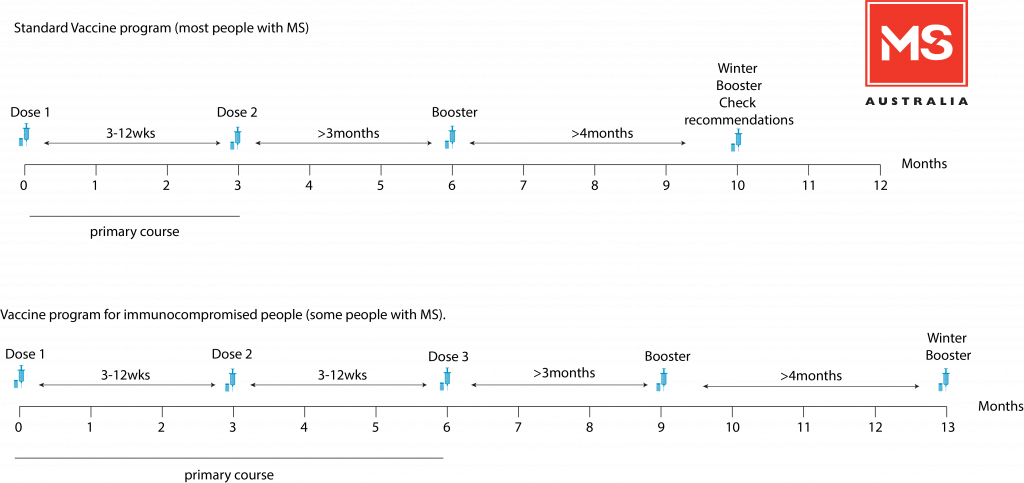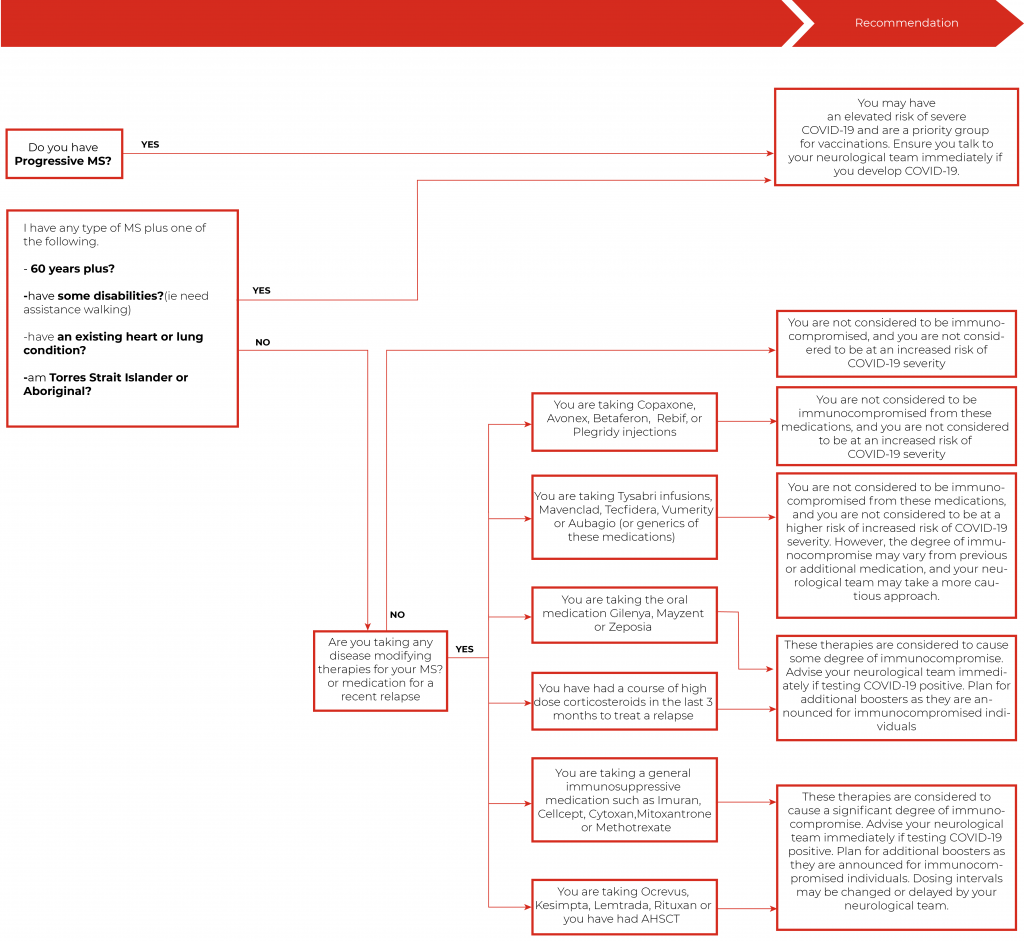A group of local neurologists with a special interest in MS through the Australian and New Zealand Association of Neurologists (ANZAN), have together with MS Australia, provided COVID-19 vaccination guidance addressing many common questions from people living with MS. However, your MS healthcare team and neurologist remain your primary advisors for your individual situation regarding your DMT, medications and vaccination timing.
With over 10 billion vaccines administered worldwide, vaccines remain the best protector against severe COVID-19. Numerous factors known to increase the risk of complications and death from COVID-19 have been clearly defined (age over 60, obesity, diabetes, heart disease, lung disease, high blood pressure, pregnancy and ethnicity).
Evidence shows that a person with multiple sclerosis (MS) is no more likely to develop COVID-19 or its complications, including if on treatment (with the possible exception of those on ocrelizumab who may be at very slightly increased risk).
Those with progressive MS and/or higher levels of disability, heart or lung disease, or advanced age may be at increased risk of complications from COVID-19.
Due to the successful COVID-19 vaccination rollout in Australia, survival rates from COVID-19 have improved dramatically. The current recommendation in Australia is that all people aged 5 years and over should be vaccinated against COVID-19.
Several vaccines have been approved by the Therapeutic Goods Administration (TGA) and administered to Australians. These include the following vaccines: Pfizer/BioNTech (“Comirnaty”) AstraZeneca/Oxford (“Vaxzevria”) , Moderna (“Moderna mRNA”), and Novavax (“Nuvaxovid”) with recommendations on the use of certain vaccines in specific age groups and circumstances. All primary courses of vaccines require a minimum of two doses for the general population and three doses for people that are considered to be immunocompromised. Information on all of the approved vaccinations in Australia can be found here. There is no specific vaccine recommended for people with MS.
It is important to understand the difference between a primary course of vaccination and a booster dose. The primary course of vaccination consists of the minimum number of doses to achieve the desired immune response. In clinical trials for COVID-19, this was demonstrated to be two doses of vaccine given between 3 and 12 weeks apart, depending on the type of vaccination (Pfizer/”Cominarty” or Astra Zeneca/”Vaxzevria” or Novavax/Biocelect (Nuvaxovid)). However, for people who are severely immunocompromised, it was determined that a third dose would be necessary to complete the primary course of vaccination and provide adequate protection against COVID-19. In contrast, a booster vaccination is administered sometime after the primary course of vaccination, to remind the body how to fight the virus. In the case of COVID-19, the booster dose is currently administered 3 months after the primary course of vaccination is completed for people aged 16 years and older.
For most people with MS, this means they will have a 2-dose primary course of vaccinations for COVID-19, followed by a booster dose 3 months later, just like the general population of Australia. However, some people with MS are deemed to be in the severely immunocompromised group because of medications they may be receiving to treat their MS. Currently, this group includes ocrelizumab (Ocrevus), ofatumumab (Kesimpta), rituximab (various trade names), alemtuzumab (Lemtrada), fingolimod (Gilenya), ozanimod (Zeposia) and siponimod (Mayzent) and some other immunosuppressive medications for MS (such as high dose corticosteroids to treat a relapse) or other co-existing diseases. For these people, they will require a 3-dose primary course of vaccinations for COVID-19, followed by a booster dose 3 months later.


Information about vaccination pathways has been provided by the Department of Health and Aged Care and can be viewed here.
It is currently recommended that everyone over the age of 5 years should be vaccinated against COVID-19. There is no evidence that people with MS are at a greater risk of adverse events following COVID-19 vaccination. Studies in the US, EU and Australia are continually monitoring people with MS. However, there is no theoretical reason why any of the currently available vaccines should pose any particular risk to a person with MS. The risks of COVID-19 are very real, are higher in a person with MS who has higher levels of disability, and far outweigh any conceivable risks from the vaccines. As a person with MS, you should be vaccinated.
There is currently no evidence to suggest that this might be the case. All of the COVID-19 vaccines can produce side effects that include fever and fatigue. Fever can on rare occasions cause a re-emergence of previous MS symptoms (a so-called “pseudo-relapse”), but it is widely thought that this only lasts as long as the fever is present (usually less than 24 hours with these vaccines) and does not imply any new inflammation or damage to the nervous system. Similarly, fatigue due to vaccination can be similar to and might compound MS-related fatigue, but this should only be temporary..
The practicalities are that you should receive your vaccine whenever it is offered to you. However, there are recommendations regarding specific disease modifying therapies (DMTs) to be aware of. These include Ocrevus (ocrelizumab), Kesimpta (ofatumumab), Lemtrada (alemtuzumab), Gilenya (fingolimod), Mayzent (Siponimod) and Zeposia (ozanimod). Additionally if you are being considered for AHSCT, your MS healthcare team and neurologist will be able to advise the best management strategy for your particular circumstance and medication history.
It is not recommended that you suspend your MS therapy around the time of your vaccination unless on the advice of your neurologist. The risks to your long-term health of developing a re-occurrence of your MS on stopping therapy are far greater than any potential risks from vaccination. For those on intermittent therapies or who are just about to start a new therapy there may be some scope to better coordinate the timing of your therapy with any planned vaccination, but this should only be done in consultation with your neurologist to ensure that the risks of any delay with your therapy will be minimal or can be reduced in some way.
The clinical trials and approval processes used in each country or region to assess the safety of medications and vaccines have been identical to normal processes, they have simply been undertaken more rapidly than usual because of the urgency of the situation. The process of approval by the TGA, who approve medications and vaccines in Australia, has been completed with due diligence for the approved vaccines.
Whilst there are some small differences in the efficacy and side effect profiles for each of the vaccines, all of the COVID-19 vaccines that are currently available are very effective and very safe. All the vaccines have shown that they effectively remove the risk of dying from COVID-19. You should therefore have the vaccine that is offered to you. This is likely to be determined by prioritisation and local availability.
You should advise the person administering the COVID-19 vaccine if you have ever had an allergic reaction to either an earlier dose of the COVID-19 vaccine or any other vaccination. Some vaccines do contain other components to which some people can react. Some of the COVID-19 vaccines have specifically avoided having any of the common precipitants for these types of reaction. The person administering the vaccine will be able to advise on whether or not it will be safe to proceed with the particular vaccine being offered.
For more information on COVID-19 and MS, please click here.